UNCC100: Essay on Catholic Social Teaching, Community, and Flourishing
VerifiedAdded on 2020/07/22
|6
|1260
|96
Essay
AI Summary
This essay provides an overview of the principles of Catholic Social Teaching (CST), examining their impact on both individuals and the community. It begins with an introduction to CST, emphasizing God's plan for the world and the importance of love, justice, and peace. The essay then details nine key principles, including the dignity of the human person, the common good, subsidiarity, the universal purpose of goods, stewardship of creation, promotion of peace, global solidarity, participation, and preferential option for the poor. Each principle is explained with its implications for social life. The essay then explores the relationship between the self and the community based on CST, highlighting the concept of human flourishing and its connection to meeting physiological, social, psychological, and emotional needs. The essay concludes by reiterating the importance of respecting oneself and society, particularly supporting the vulnerable and poor, to foster economic and social flourishing. The essay uses references to support the arguments and principles discussed.

Uncc100
Paraphrase This Document
Need a fresh take? Get an instant paraphrase of this document with our AI Paraphraser
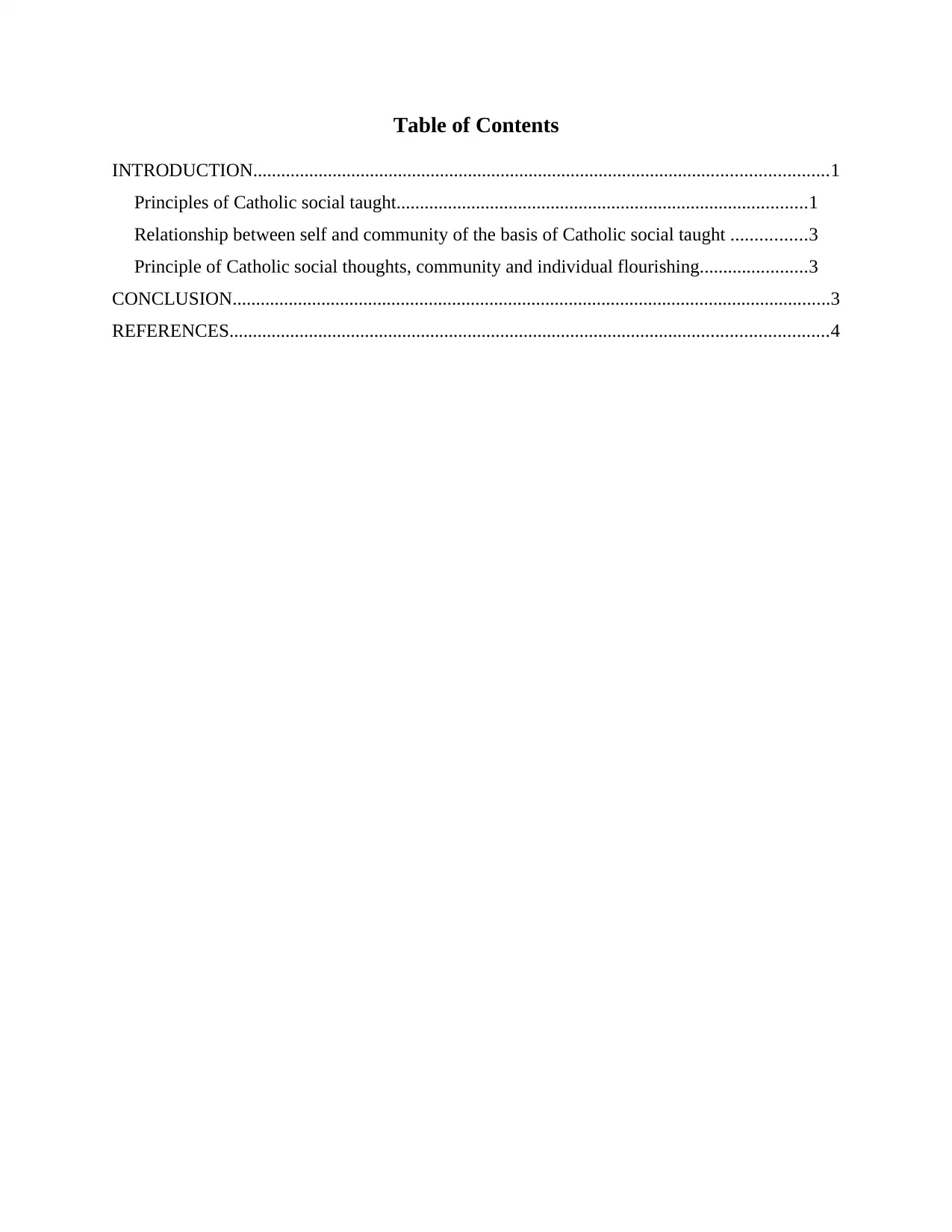
Table of Contents
INTRODUCTION...........................................................................................................................1
Principles of Catholic social taught........................................................................................1
Relationship between self and community of the basis of Catholic social taught ................3
Principle of Catholic social thoughts, community and individual flourishing.......................3
CONCLUSION................................................................................................................................3
REFERENCES................................................................................................................................4
INTRODUCTION...........................................................................................................................1
Principles of Catholic social taught........................................................................................1
Relationship between self and community of the basis of Catholic social taught ................3
Principle of Catholic social thoughts, community and individual flourishing.......................3
CONCLUSION................................................................................................................................3
REFERENCES................................................................................................................................4
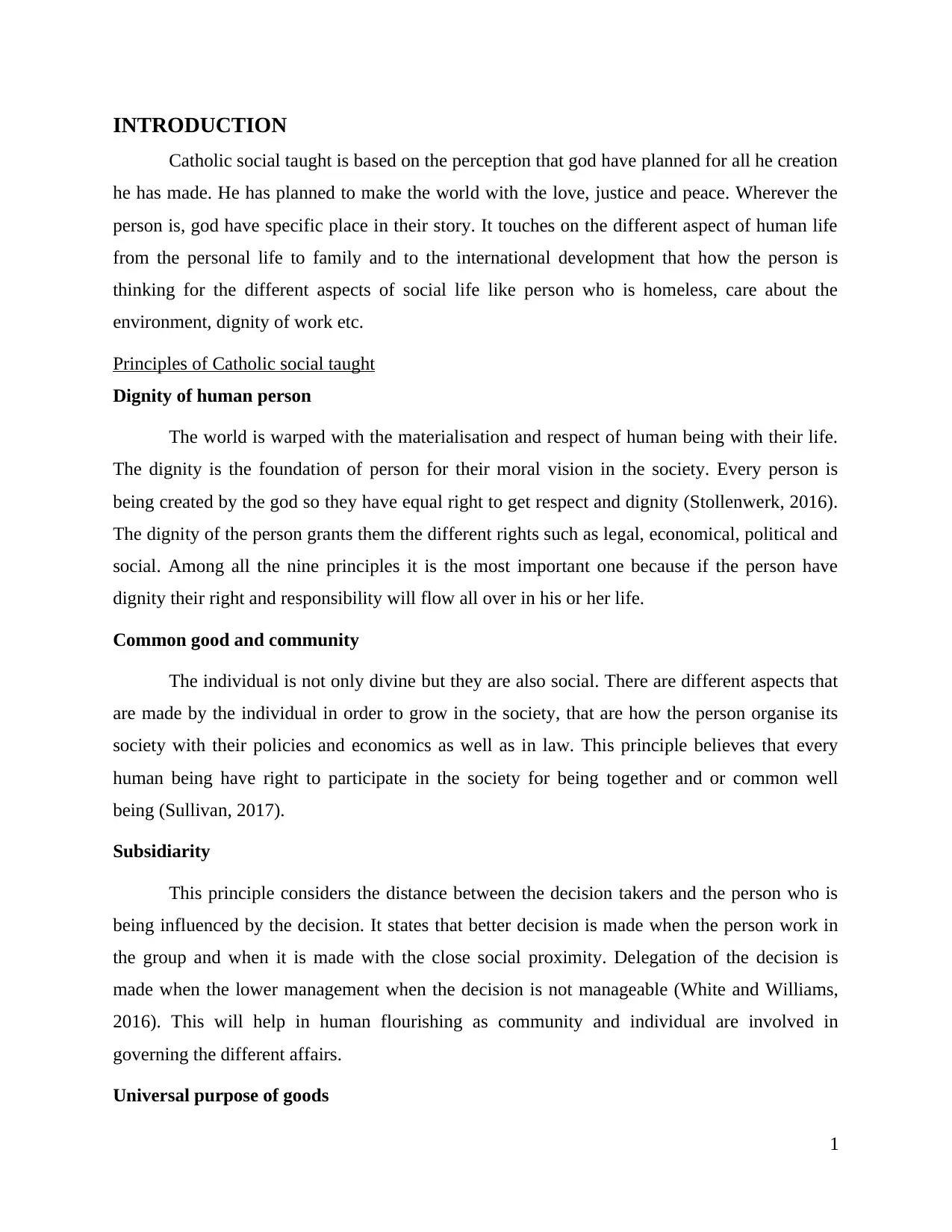
INTRODUCTION
Catholic social taught is based on the perception that god have planned for all he creation
he has made. He has planned to make the world with the love, justice and peace. Wherever the
person is, god have specific place in their story. It touches on the different aspect of human life
from the personal life to family and to the international development that how the person is
thinking for the different aspects of social life like person who is homeless, care about the
environment, dignity of work etc.
Principles of Catholic social taught
Dignity of human person
The world is warped with the materialisation and respect of human being with their life.
The dignity is the foundation of person for their moral vision in the society. Every person is
being created by the god so they have equal right to get respect and dignity (Stollenwerk, 2016).
The dignity of the person grants them the different rights such as legal, economical, political and
social. Among all the nine principles it is the most important one because if the person have
dignity their right and responsibility will flow all over in his or her life.
Common good and community
The individual is not only divine but they are also social. There are different aspects that
are made by the individual in order to grow in the society, that are how the person organise its
society with their policies and economics as well as in law. This principle believes that every
human being have right to participate in the society for being together and or common well
being (Sullivan, 2017).
Subsidiarity
This principle considers the distance between the decision takers and the person who is
being influenced by the decision. It states that better decision is made when the person work in
the group and when it is made with the close social proximity. Delegation of the decision is
made when the lower management when the decision is not manageable (White and Williams,
2016). This will help in human flourishing as community and individual are involved in
governing the different affairs.
Universal purpose of goods
1
Catholic social taught is based on the perception that god have planned for all he creation
he has made. He has planned to make the world with the love, justice and peace. Wherever the
person is, god have specific place in their story. It touches on the different aspect of human life
from the personal life to family and to the international development that how the person is
thinking for the different aspects of social life like person who is homeless, care about the
environment, dignity of work etc.
Principles of Catholic social taught
Dignity of human person
The world is warped with the materialisation and respect of human being with their life.
The dignity is the foundation of person for their moral vision in the society. Every person is
being created by the god so they have equal right to get respect and dignity (Stollenwerk, 2016).
The dignity of the person grants them the different rights such as legal, economical, political and
social. Among all the nine principles it is the most important one because if the person have
dignity their right and responsibility will flow all over in his or her life.
Common good and community
The individual is not only divine but they are also social. There are different aspects that
are made by the individual in order to grow in the society, that are how the person organise its
society with their policies and economics as well as in law. This principle believes that every
human being have right to participate in the society for being together and or common well
being (Sullivan, 2017).
Subsidiarity
This principle considers the distance between the decision takers and the person who is
being influenced by the decision. It states that better decision is made when the person work in
the group and when it is made with the close social proximity. Delegation of the decision is
made when the lower management when the decision is not manageable (White and Williams,
2016). This will help in human flourishing as community and individual are involved in
governing the different affairs.
Universal purpose of goods
1
⊘ This is a preview!⊘
Do you want full access?
Subscribe today to unlock all pages.

Trusted by 1+ million students worldwide
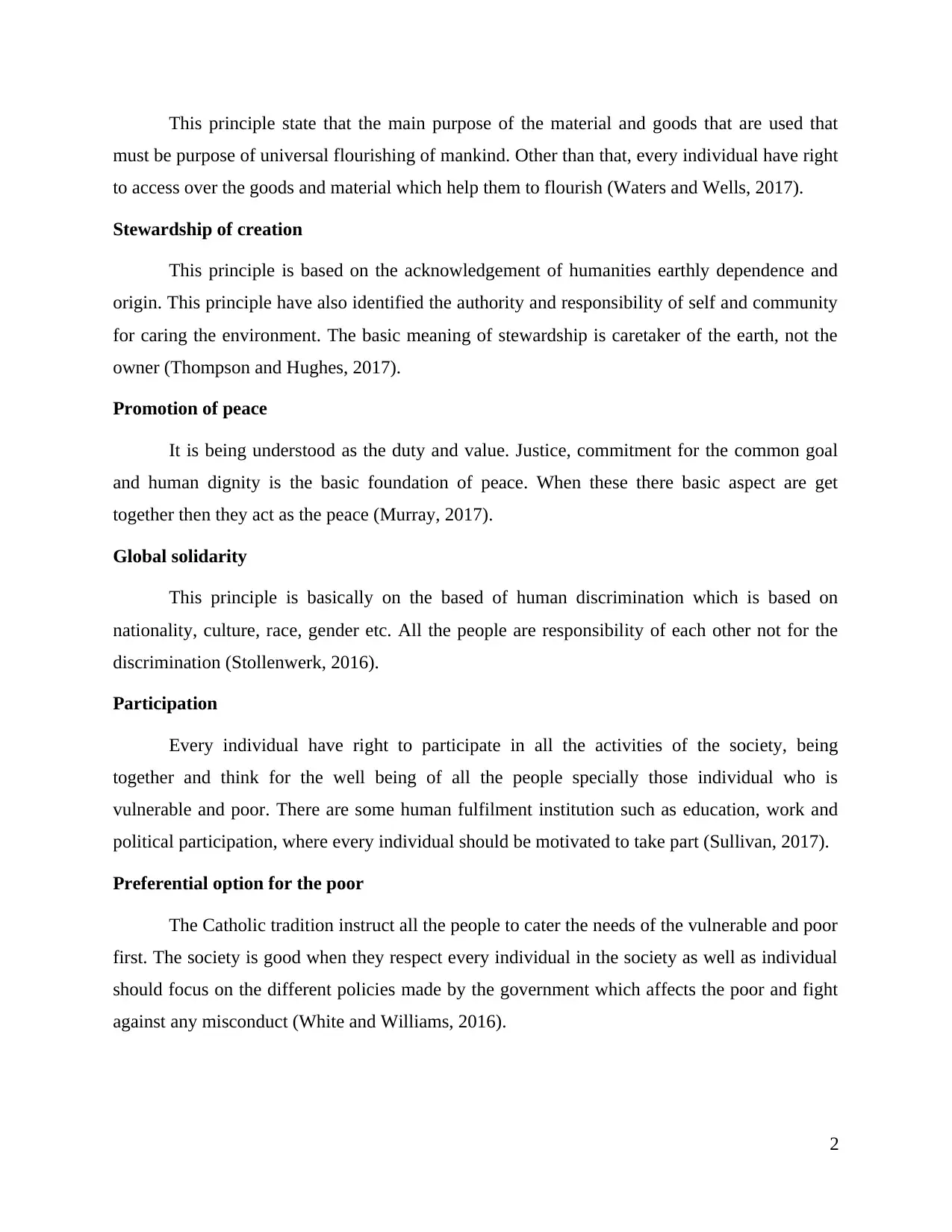
This principle state that the main purpose of the material and goods that are used that
must be purpose of universal flourishing of mankind. Other than that, every individual have right
to access over the goods and material which help them to flourish (Waters and Wells, 2017).
Stewardship of creation
This principle is based on the acknowledgement of humanities earthly dependence and
origin. This principle have also identified the authority and responsibility of self and community
for caring the environment. The basic meaning of stewardship is caretaker of the earth, not the
owner (Thompson and Hughes, 2017).
Promotion of peace
It is being understood as the duty and value. Justice, commitment for the common goal
and human dignity is the basic foundation of peace. When these there basic aspect are get
together then they act as the peace (Murray, 2017).
Global solidarity
This principle is basically on the based of human discrimination which is based on
nationality, culture, race, gender etc. All the people are responsibility of each other not for the
discrimination (Stollenwerk, 2016).
Participation
Every individual have right to participate in all the activities of the society, being
together and think for the well being of all the people specially those individual who is
vulnerable and poor. There are some human fulfilment institution such as education, work and
political participation, where every individual should be motivated to take part (Sullivan, 2017).
Preferential option for the poor
The Catholic tradition instruct all the people to cater the needs of the vulnerable and poor
first. The society is good when they respect every individual in the society as well as individual
should focus on the different policies made by the government which affects the poor and fight
against any misconduct (White and Williams, 2016).
2
must be purpose of universal flourishing of mankind. Other than that, every individual have right
to access over the goods and material which help them to flourish (Waters and Wells, 2017).
Stewardship of creation
This principle is based on the acknowledgement of humanities earthly dependence and
origin. This principle have also identified the authority and responsibility of self and community
for caring the environment. The basic meaning of stewardship is caretaker of the earth, not the
owner (Thompson and Hughes, 2017).
Promotion of peace
It is being understood as the duty and value. Justice, commitment for the common goal
and human dignity is the basic foundation of peace. When these there basic aspect are get
together then they act as the peace (Murray, 2017).
Global solidarity
This principle is basically on the based of human discrimination which is based on
nationality, culture, race, gender etc. All the people are responsibility of each other not for the
discrimination (Stollenwerk, 2016).
Participation
Every individual have right to participate in all the activities of the society, being
together and think for the well being of all the people specially those individual who is
vulnerable and poor. There are some human fulfilment institution such as education, work and
political participation, where every individual should be motivated to take part (Sullivan, 2017).
Preferential option for the poor
The Catholic tradition instruct all the people to cater the needs of the vulnerable and poor
first. The society is good when they respect every individual in the society as well as individual
should focus on the different policies made by the government which affects the poor and fight
against any misconduct (White and Williams, 2016).
2
Paraphrase This Document
Need a fresh take? Get an instant paraphrase of this document with our AI Paraphraser
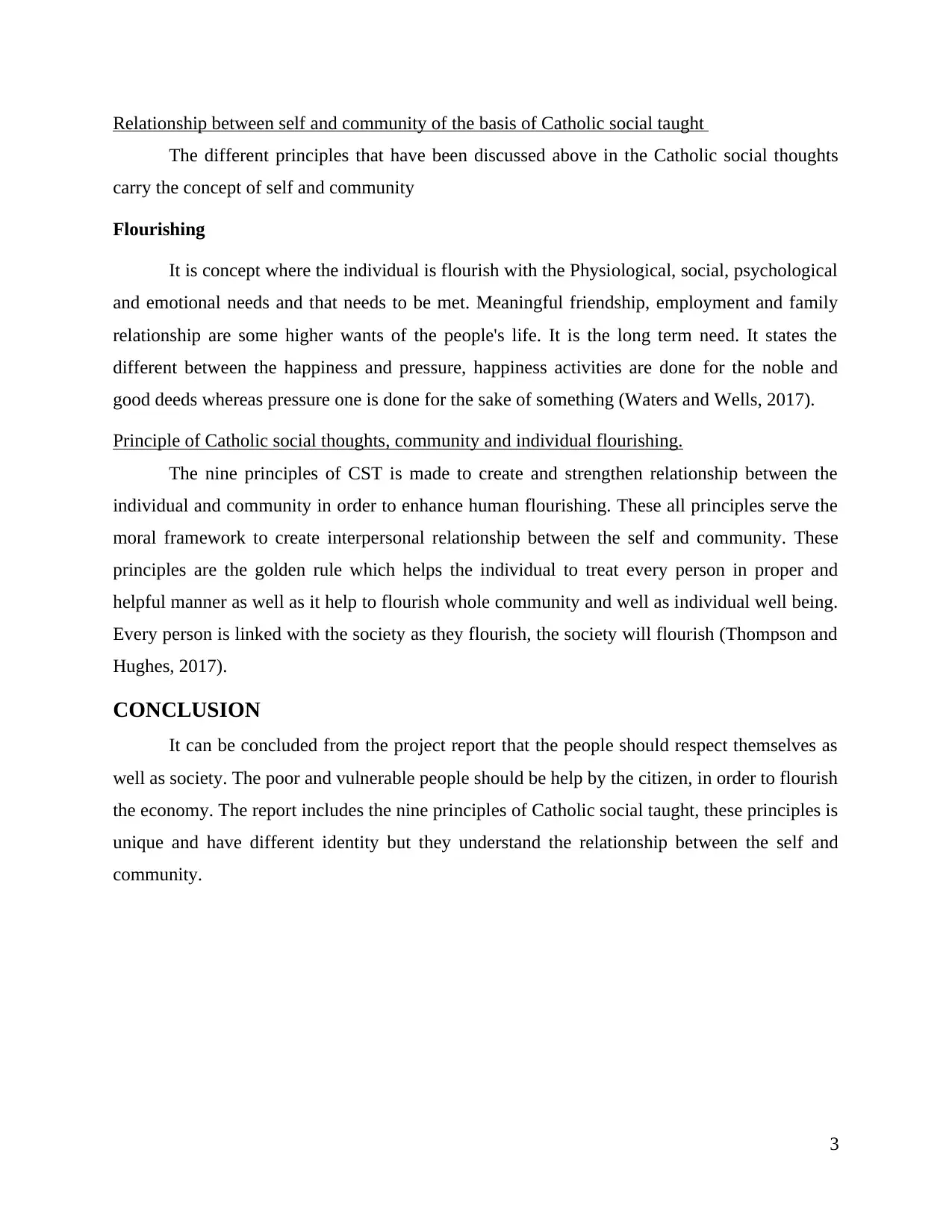
Relationship between self and community of the basis of Catholic social taught
The different principles that have been discussed above in the Catholic social thoughts
carry the concept of self and community
Flourishing
It is concept where the individual is flourish with the Physiological, social, psychological
and emotional needs and that needs to be met. Meaningful friendship, employment and family
relationship are some higher wants of the people's life. It is the long term need. It states the
different between the happiness and pressure, happiness activities are done for the noble and
good deeds whereas pressure one is done for the sake of something (Waters and Wells, 2017).
Principle of Catholic social thoughts, community and individual flourishing.
The nine principles of CST is made to create and strengthen relationship between the
individual and community in order to enhance human flourishing. These all principles serve the
moral framework to create interpersonal relationship between the self and community. These
principles are the golden rule which helps the individual to treat every person in proper and
helpful manner as well as it help to flourish whole community and well as individual well being.
Every person is linked with the society as they flourish, the society will flourish (Thompson and
Hughes, 2017).
CONCLUSION
It can be concluded from the project report that the people should respect themselves as
well as society. The poor and vulnerable people should be help by the citizen, in order to flourish
the economy. The report includes the nine principles of Catholic social taught, these principles is
unique and have different identity but they understand the relationship between the self and
community.
3
The different principles that have been discussed above in the Catholic social thoughts
carry the concept of self and community
Flourishing
It is concept where the individual is flourish with the Physiological, social, psychological
and emotional needs and that needs to be met. Meaningful friendship, employment and family
relationship are some higher wants of the people's life. It is the long term need. It states the
different between the happiness and pressure, happiness activities are done for the noble and
good deeds whereas pressure one is done for the sake of something (Waters and Wells, 2017).
Principle of Catholic social thoughts, community and individual flourishing.
The nine principles of CST is made to create and strengthen relationship between the
individual and community in order to enhance human flourishing. These all principles serve the
moral framework to create interpersonal relationship between the self and community. These
principles are the golden rule which helps the individual to treat every person in proper and
helpful manner as well as it help to flourish whole community and well as individual well being.
Every person is linked with the society as they flourish, the society will flourish (Thompson and
Hughes, 2017).
CONCLUSION
It can be concluded from the project report that the people should respect themselves as
well as society. The poor and vulnerable people should be help by the citizen, in order to flourish
the economy. The report includes the nine principles of Catholic social taught, these principles is
unique and have different identity but they understand the relationship between the self and
community.
3
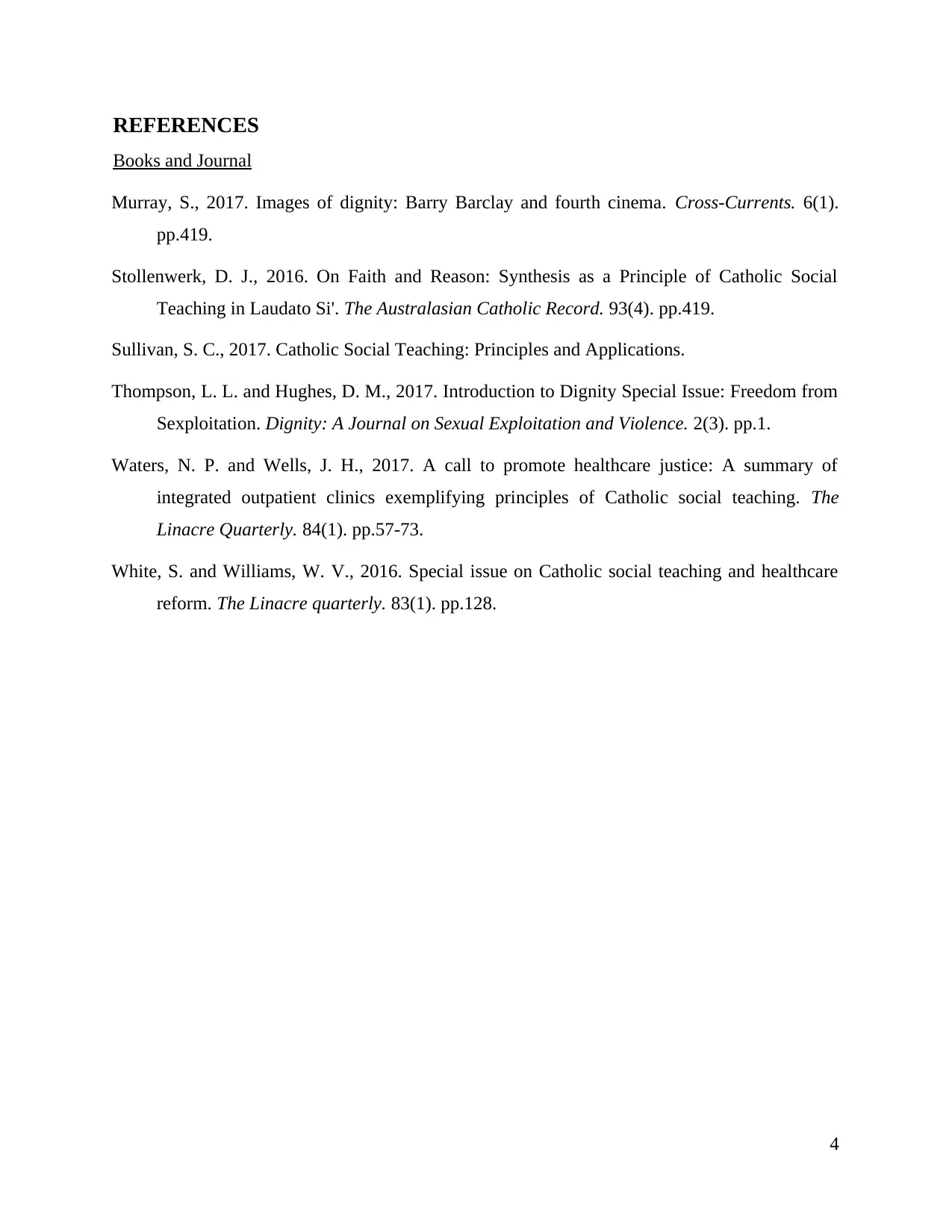
REFERENCES
Books and Journal
Murray, S., 2017. Images of dignity: Barry Barclay and fourth cinema. Cross-Currents. 6(1).
pp.419.
Stollenwerk, D. J., 2016. On Faith and Reason: Synthesis as a Principle of Catholic Social
Teaching in Laudato Si'. The Australasian Catholic Record. 93(4). pp.419.
Sullivan, S. C., 2017. Catholic Social Teaching: Principles and Applications.
Thompson, L. L. and Hughes, D. M., 2017. Introduction to Dignity Special Issue: Freedom from
Sexploitation. Dignity: A Journal on Sexual Exploitation and Violence. 2(3). pp.1.
Waters, N. P. and Wells, J. H., 2017. A call to promote healthcare justice: A summary of
integrated outpatient clinics exemplifying principles of Catholic social teaching. The
Linacre Quarterly. 84(1). pp.57-73.
White, S. and Williams, W. V., 2016. Special issue on Catholic social teaching and healthcare
reform. The Linacre quarterly. 83(1). pp.128.
4
Books and Journal
Murray, S., 2017. Images of dignity: Barry Barclay and fourth cinema. Cross-Currents. 6(1).
pp.419.
Stollenwerk, D. J., 2016. On Faith and Reason: Synthesis as a Principle of Catholic Social
Teaching in Laudato Si'. The Australasian Catholic Record. 93(4). pp.419.
Sullivan, S. C., 2017. Catholic Social Teaching: Principles and Applications.
Thompson, L. L. and Hughes, D. M., 2017. Introduction to Dignity Special Issue: Freedom from
Sexploitation. Dignity: A Journal on Sexual Exploitation and Violence. 2(3). pp.1.
Waters, N. P. and Wells, J. H., 2017. A call to promote healthcare justice: A summary of
integrated outpatient clinics exemplifying principles of Catholic social teaching. The
Linacre Quarterly. 84(1). pp.57-73.
White, S. and Williams, W. V., 2016. Special issue on Catholic social teaching and healthcare
reform. The Linacre quarterly. 83(1). pp.128.
4
⊘ This is a preview!⊘
Do you want full access?
Subscribe today to unlock all pages.

Trusted by 1+ million students worldwide
1 out of 6
Related Documents
Your All-in-One AI-Powered Toolkit for Academic Success.
+13062052269
info@desklib.com
Available 24*7 on WhatsApp / Email
![[object Object]](/_next/static/media/star-bottom.7253800d.svg)
Unlock your academic potential
Copyright © 2020–2026 A2Z Services. All Rights Reserved. Developed and managed by ZUCOL.




